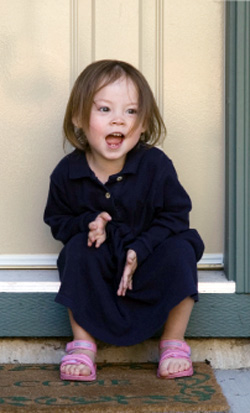Terrible or Terrific Twos

by Faith Golden
Everybody has heard of the “terrible two’s” and most of us have had some personal experience with them. The two year old behavior known as the “terrible two’s” occurs because the children are no longer completely dependent. They have new skills that they want to try out themselves, yet they still want their parents around for comfort. So, they don’t really know what they want from minute to minute, which is aggravating to their parents and others around them.
Here are a few hints to help the terrible two’s turn into terrific two’s. First, don’t give your toddler a choice where there is none. For example if it is time to brush their teeth you should say, “Time to brush your teeth” instead of “Do you want to brush your teeth?” When you ask a toddler a “yes” or “no” question, it implies that you are giving them a choice. If there is no choice, don’t unintentionally offer your child a choice. Choose your words carefully. If you give your child a choice and he chooses not to brush his teeth, oops, you made a mistake that you will remember not to do again.
Second, give your child the power to make choices whenever he can. By giving your child choices you are allowing your child to feel empowered. When a person feels empowered, it leads to self-esteem, which is what parents want their child to have. When a child feels empowered, he doesn’t have to try to win his power, since he already feels powerful through decision-making thus there is no need for power struggles. So, the night before daycare, lay out two appropriate outfits and give your toddler a choice between the two instead of just telling your child “wear this” or overwhelming him with an entire closet to choose from. Another way to use choices is to give your child choices about their own behavior based on natural and logical consequences. Let me give you an example. If your child is interrupting your conversation with another adult, you can say, “I need you to wait until I am finished talking, then I will talk to you. If you choose not to wait, you will be choosing to go to your room where you can talk as much as you want.” If the child is quiet, he can stay in the room, but if he continues to interrupt, the parent says, “I see you have chosen to go and talk in your room.” Then walk the child into his room. Finish your conversation (remember that a two year old can only wait 2 minutes) then go and give your child your full attention. When you are consistent with the follow through, your toddler will quickly realize that their choices have an impact and that you mean what you say (and that you, can be trusted.) Never argue with a child of any age. You are the parent and what you say is the way it is. Set this precedent now!
A two-year olds job is to test limits, explore new things, and try out their new independence. Your job as the parent is to set developmentally appropriate limits that your child can explore in, keep your child safe (but don’t hover, he will learn best by making mistakes, falling and getting up etc.), and hold the limits that you set so that your child learns that you mean what you say and say what you mean. When he knows this, he will know that you love him and will keep him safe always in this big place called the world. He will know that he always has a safe place to go, where no matter what happens, he will be loved and taken care of unconditionally. This is the job of a parent. No one else can do this job but you. Your child will have many friends in his life but only two parents. You need to get this right in order for your child to feel safe, secure and loved for the rest of his life. Calm your body and your mind before talking to him or approaching him if you are upset. You are the role model that he will follow. He will learn to blow up or be calm by watching you. He will learn to follow directions or disregard them by watching you. Your child will become the person he will be by the way you parent and teach him from birth to five.
By the way, it isn’t smooth sailing once you pass the terrible/terrific two’s. You will go through all of the testing the limits and attempts at independence vs. dependence when your child hits his teen years. It is just so fun being a parent…but I wouldn’t have missed a minute of it for anything; now that my kids are grown and I see what wonderful people they are. You will feel the same way. Trust me. If you are interested in more information on preparing for baby, parenting techniques and tips that can be used in your unique family situation, read more on the It’s Aparent website, itsaparentparent.com or call (818) 995-9757 for a free consultation.
© Faith Golden 2013. This material may not be copied or used in any manner without the express written permission by the author.




